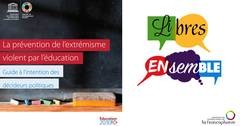
GCED Basic Search Form
Quick Search
현재 위치
뉴스

UNESCO (Dakar, Headquarters and IICBA), the UNESCO Asia-Pacific Centre for International Understanding (APCEIU) and the Organisation Internationale de la Francophonie (OIF), represented by its Institut de la Francophonie pour l’éducation et la formation (IFEF), organized a capacity-building workshop on prevention of violent extremism through education (PVE-E) in West Africa and the Sahel. This event took place in Dakar, Senegal, from 9 to 11 May 2017.
In today’s globalized and interconnected world, the growing threats and acts of violent extremism in West Africa and the Sahel create climates of fear and insecurity, which are adversely affecting peace and development efforts. Providing young people with knowledge, skills and values for them to nurture respect for all, building a sense of belonging to a common humanity and helping them to become responsible and active citizens is critical for a more just and sustainable world.
UNESCO, APCEIU and IFEF jointly organized in Dakar, from 9 to 11 May 2017, a workshop aiming at strengthening capacities of education policy makers (Parliamentarians, Permanent Secretaries and Chiefs of Cabinet of Ministries of Education, senior officials in charge of teacher education or curricula) and senior teacher trainers to design and implement relevant and effective policies and practices that contribute to prevention of violent extremism (PVE) and eventually to sustainable peace in West Africa and the Sahel. About forty participants from Burkina Faso, Côte d’Ivoire, the Gambia, Guinea-Bissau, Liberia, Mali, Mauritania, Niger, Senegal and Sierra Leone attended this workshop as well as education, PVE-E experts.
First, presentations on international and regional normative instruments as well as on security and peace situation in the West African region and the Sahel provided an overview of the context.
Then, in addition to the Clearinghouse on Global Citizenship Education (GCED) hosted by APCEIU, two tools on PVE-E developed by UNESCO were introduced: (1) a Guide on PVE for education policy makers, to support national efforts to integrate GCED into their education systems, and (2) a Teachers’ Guide on managing classroom discussions in relation to the PVE. OIF also presented the #LibresEnsemble (FreeTogether) Initiative launched to give a voice to young people to express their views on citizenship, freedom, diversity, living together, etc. through social media and education, as well as cultural, economic and artistic activities.
Building on these tools and examples of PEV-E approaches and practices in formal, non-formal and informal education settings, country delegations drafted a roadmap for integration of PVE into education policies and practices, considering the context, the needs and capacities of respective countries.
At the end of the workshop, participants expressed their commitment to reinforce advocacy amongst high-level authorities in their country, to suggest law and legal frameworks on PVE-E, to integrate PVE into education sector plans, curricula, education personnel training (formal, non-formal and informal) and to further involve communities.
The organizers will ensure follow up on recommendations by developing a platform for exchange and experience sharing, establishing an exchange network, supporting countries in ownership and adaptation of the tools developed by UNESCO and OIF (pedagogical guide and #LibresEnsemble).
"The most remarkable result is that everyone has had a prospective look. We hope that this way, national visions and strategies will gain ground and will really transform this reality. " said Mamadou Ndoye, former Minister of Education of Senegal and moderator of the workshop.
